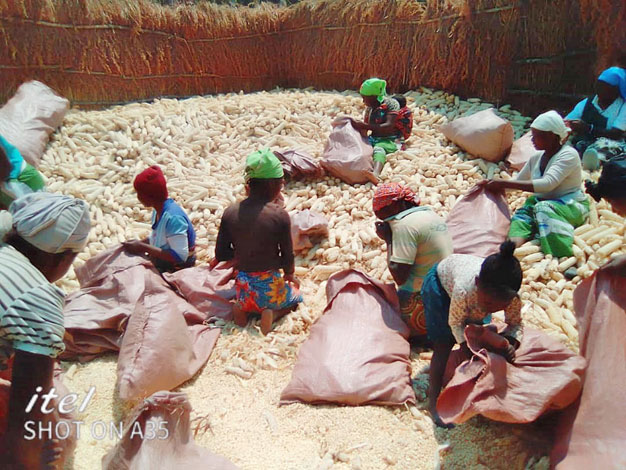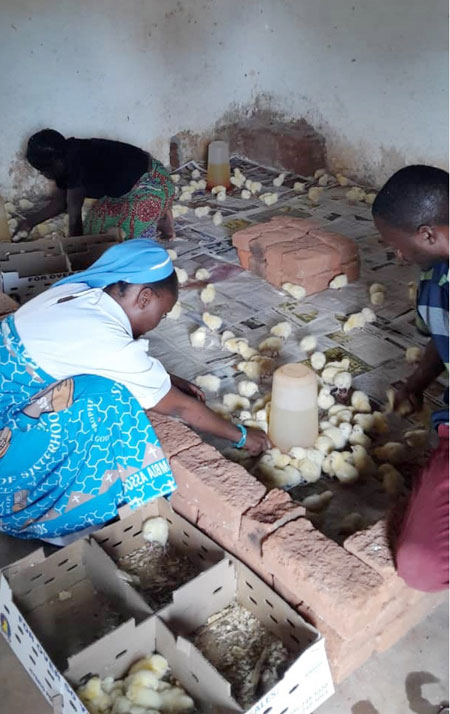
Women shell corn in Zambia. Missio Invest farmer/mentor program works with the Catholic community there.
By Barb Arland-Fye
The Catholic Messenger
Connecting Catholic farmers in the Davenport Diocese with priests, sisters and brothers who manage agricultural property in sub-Saharan Africa will cultivate Christ-centered relationships and sustainable farming, organizers of a new diocesan project say.
The blueprint for the initiative already exists in the Diocese of Salina, Kansas, with a pilot project created in cooperation with Missio Invest, which serves as a vehicle to strengthen a network of crucial services in sub-Saharan Africa. These services include church-run schools and health facilities attached to farmable land, much of it underutilized because of lack of funds and commercial experience.
Missio Invest, created through the inspiration of Pope Francis, provides financing for agribusiness, health and education enterprises and church-run financial institutions that administer loans and banking products in these underserved communities.
The Davenport Diocese will become the second partner in the farmer/mentor initiative, said Joelle Birge, vice president of lending for Missio Invest. The farm manager mentees “are very appreciative for the support and are all eager to learn from their mentors and to share their farming experiences,” she said.
“We hope that it fosters a greater understanding of and appreciation for the work that our Catholic brothers and sisters are doing in Africa and in other parts of the world. We hope that the relationships are mutually beneficial, with the U.S. mentors learning from the mentees and the mentees learning from the mentors through mutual sharing about their farms, faiths and cultures.”
Bishop Thomas Zinkula, who serves on the Subcommittee on the Church in Africa of the U.S. Conference of Catholic Bishops, feels a strong connection to the people of Africa.
He learned about Missio Invest from its founder and CEO, Father Andrew Small, OMI.
“Father Small was a consultant to the subcommittee when I joined it; that is how I became acquainted with him. Given the role that agriculture plays in our diocese, the farmer mentor project is a perfect fit for us,” Bishop Zinkula said. “We have many knowledgeable, experienced and successful Catholic farmers who would have a lot to offer farmers in Africa, and who would enjoy entering into a relationship with and learning from farmers in Africa. I would like to think that there would be at least a few who would be intrigued by this opportunity to share their blessings with farmers in a less privileged part of the world and to be blessed in return by their collaboration.”

Sister Mary Chilengwe collects baby chicks in Zambia, Africa.
The bishop asked Social Action Office Director Kent Ferris and Deacon Dan Freeman to look into the farmer mentor project. They connected with Father Steve Heina, a priest of the Salina Diocese, who learned about Missio Invest in 2018 and thought the program to help farm managers improve the efficiency of their farm operations sounded terrific. However, he thought advice from farmers in the U.S. might make the program even better.
His suggestion led to the pilot project that he and retired ag-businessman Tom Murphy of the Salina Diocese helped develop. “It’s a pilot project, we’re building it from scratch,” said Father Heina, who coordinates the project in his diocese. Currently, farmers in the Salina Diocese are mentors to farm managers of five projects in sub-Saharan Africa.
Farmers connect with the farmer managers via social media. Father Heina said the tricky part was convincing Kansas farmers that mentors and mentees learn from each other. “The mentor relationship depends on a genuine, personal interest to learn from the mentee.” It is about allowing the Holy Spirit to dwell within the relationship, the dialogue, he said. “Americans are hardwired to help, but not so good at recognizing how we can be helped. It takes a unique personality to be a mentor.” In addition, “We found it really helpful for the mentoring candidate to be a practicing Catholic.”
Father Heina’s presentation on Missio Invest to a local chapter of Catholic Rural Life intrigued Murphy, who led the chapter at the time. He said he and his wife, Jo, would be willing to step up. Murphy worked with Father Heina to develop the roles, responsibilities and expectations of farmer mentors.
Murphy took on the role of mentor himself, developing a prayerful, enriching relationship with Sister Mary Chilengwe in Zambia. “What that woman can do is nothing short of amazing,” says Murphy, a Deere & Co. retiree who once lived in Bettendorf and attended St. John Vianney Parish there.
Sister Mary runs a school, a convent and oversees a diverse farm that provides food and jobs for the people she serves. She and Murphy talk several times a month, sometimes a couple of times a week through text messages and even exchange short videos. Their relationship covers everything from troubleshooting challenges on the farm to praying for each other’s families.
“We share the joys and the hardships,” Murphy says. He helped Sister Mary to discover a new food source that she did not realize was growing on the farm, breadfruit, which can become a nutrient-rich flour. Farming techniques in sub-Saharan Africa are decades behind the U.S., so some of the problem solving involves great creativity, he added.
More farmer mentors needed
Murphy provides this “job description” for farmer/mentor candidates: a person with a desire to serve Christ through missionary outreach, a person with knowledge of ag production, a volunteer to be a mentor with specific ag projects in Africa, a person with leadership and communication skills via multimedia, a person who wants to make a difference.
The need for mentors extends beyond the five projects the Salina Diocese has taken on. “Missio Invest has approved 54 loans to date across eight countries. So far, only five of those projects have mentors. We issue approximately 20-30 new loans each year across the nine countries where we currently operate (Kenya, Uganda, Tanzania, Rwanda, Ethiopia, Nigeria, Ghana, Malawi, Zambia), Birge said.
That is where the Diocese of Davenport comes in. Ferris and Deacon Freeman, parish life coordinator of St. Mary Parish in Wilton and diocesan representative for Catholic Rural Life, worked with Father Heina and Murphy for guidance in tailoring a Missio Invest mentor project in the Davenport Diocese. Ferris and Deacon Freeman are enthusiastic about the project and hope to recruit farmers this fall to serve as mentors. Deacon Freeman noted that the Salina Diocese began its mentoring project focused on technical solidarity with the farm managers but shifted to relational solidarity. “You build relationships in order to help one another,” Deacon Freeman said.
“Our faith is so grounded in creation,” Ferris said. “Farmers get it.” He believes the project responds to the Laudato Si Action Platform that Pope Francis formally launched on the feast day of St. Francis to inspire Catholics and their institutions to review their impact on all of creation and to take action.
“This is an outlet for evangelization,” Deacon Freeman said. “It’s connecting and bonding in relationships. It’s showing that we care for one another.” Ferris adds, “It’s the sharing of gifts and of lives. That’s part of evangelization.”
How to get involved
Catholic farmers interested in participating in the Missio Invest Farmer Mentor project may contact Deacon Dan Freeman at freeman@davenport
diocese.org and Diocese of Davenport Social Action Director Kent Ferris at
ferris@davenportdiocese.org
Read more about Missio Invest at missioinvest.org/en/











